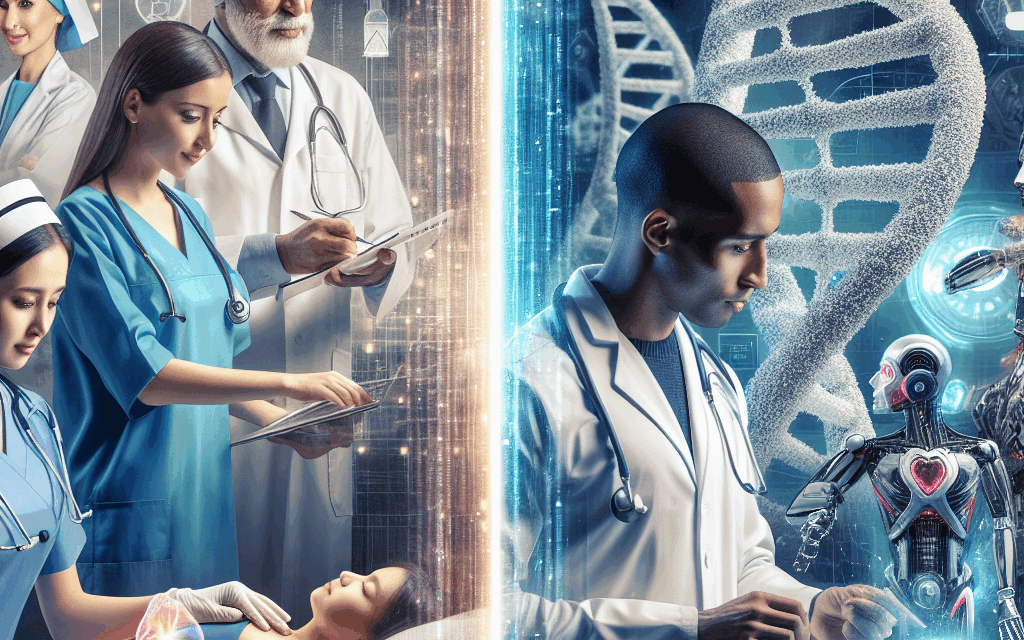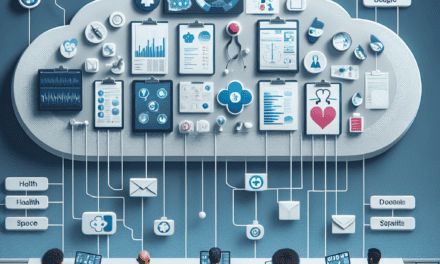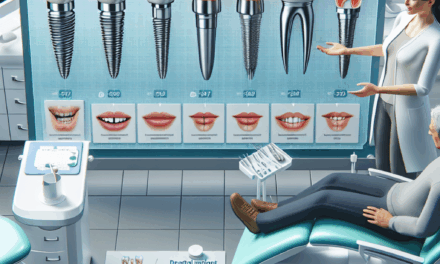Transforming Healthcare Careers: The Impact of AI on a Healthier Tomorrow
The healthcare industry is undergoing a seismic shift, driven by the rapid advancement of artificial intelligence (AI) technologies. As AI continues to evolve, it is reshaping the landscape of healthcare careers, enhancing the efficiency of medical practices, and improving patient outcomes. This article delves into the multifaceted impact of AI on healthcare careers, exploring how it transforms roles, enhances skills, and ultimately contributes to a healthier tomorrow.
1. The Evolution of Healthcare Roles in the Age of AI
As AI technologies become more integrated into healthcare systems, the roles of healthcare professionals are evolving. Traditional roles are being redefined, and new positions are emerging, necessitating a shift in skills and responsibilities.
Healthcare professionals, including doctors, nurses, and administrative staff, are increasingly required to work alongside AI systems. For instance, AI algorithms can analyze vast amounts of patient data to assist in diagnosis and treatment planning. This shift allows healthcare providers to focus more on patient care rather than administrative tasks.
- Redefining Clinical Roles: Physicians are now expected to interpret AI-generated insights, which requires a new set of skills. For example, radiologists are using AI tools to enhance image analysis, allowing them to detect anomalies with greater accuracy.
- Emergence of New Positions: The rise of AI has led to the creation of new roles such as AI specialists and data analysts within healthcare organizations. These professionals are tasked with managing AI systems and ensuring their effective integration into clinical workflows.
- Interdisciplinary Collaboration: The integration of AI necessitates collaboration between healthcare professionals and data scientists. This interdisciplinary approach fosters innovation and improves patient care.
Moreover, the demand for continuous education and training is paramount. Healthcare professionals must stay abreast of technological advancements to leverage AI effectively. Institutions are beginning to incorporate AI training into medical and nursing curricula, preparing future healthcare providers for a tech-driven environment.
2. Enhancing Patient Care Through AI Technologies
AI technologies are revolutionizing patient care by providing tools that enhance diagnosis, treatment, and patient engagement. These advancements not only improve outcomes but also streamline processes within healthcare settings.
One of the most significant applications of AI in patient care is in diagnostic imaging. AI algorithms can analyze medical images with remarkable precision, often outperforming human radiologists. For example, a study published in the journal Nature demonstrated that an AI system could detect breast cancer in mammograms with a higher accuracy rate than human experts.
- Predictive Analytics: AI can analyze patient data to predict health outcomes, enabling proactive interventions. For instance, machine learning models can identify patients at risk of developing chronic conditions, allowing healthcare providers to implement preventive measures.
- Personalized Treatment Plans: AI systems can analyze genetic information and treatment responses to tailor personalized treatment plans for patients. This approach enhances the effectiveness of therapies and minimizes adverse effects.
- Telemedicine and Virtual Health Assistants: AI-powered chatbots and virtual assistants are transforming patient engagement. They provide 24/7 support, answer queries, and assist in scheduling appointments, improving access to care.
These advancements not only enhance patient care but also reduce the burden on healthcare professionals. By automating routine tasks, AI allows providers to dedicate more time to direct patient interactions, fostering stronger patient-provider relationships.
3. The Role of AI in Administrative Efficiency
Administrative tasks in healthcare can be time-consuming and prone to errors. AI technologies are streamlining these processes, leading to increased efficiency and reduced operational costs.
One of the primary areas where AI is making an impact is in medical billing and coding. AI systems can automate the coding process, ensuring accuracy and compliance with regulations. This not only reduces the workload for administrative staff but also minimizes billing errors that can lead to revenue loss.
- Streamlining Scheduling: AI algorithms can optimize appointment scheduling by analyzing patient data and provider availability. This ensures that healthcare facilities operate at maximum efficiency, reducing wait times for patients.
- Data Management: AI can assist in managing electronic health records (EHRs) by organizing and retrieving patient information quickly. This enhances the workflow for healthcare providers and improves the quality of care.
- Fraud Detection: AI systems can analyze billing patterns to identify potential fraud or abuse. By flagging suspicious activities, healthcare organizations can protect their revenue and maintain compliance.
As administrative tasks become more efficient through AI, healthcare organizations can allocate resources more effectively, ultimately leading to improved patient care and satisfaction.
4. Ethical Considerations and Challenges of AI in Healthcare
While the benefits of AI in healthcare are substantial, there are also ethical considerations and challenges that must be addressed. The integration of AI raises questions about data privacy, bias, and the potential for job displacement.
Data privacy is a significant concern, as AI systems rely on vast amounts of patient data to function effectively. Ensuring that this data is protected and used ethically is paramount. Healthcare organizations must implement robust data governance frameworks to safeguard patient information.
- Bias in AI Algorithms: AI systems can inadvertently perpetuate biases present in the training data. For example, if an AI model is trained predominantly on data from one demographic group, it may not perform well for others. This can lead to disparities in care and outcomes.
- Job Displacement: The automation of certain tasks may lead to concerns about job loss among healthcare professionals. While AI can enhance efficiency, it is essential to strike a balance between automation and human involvement in patient care.
- Regulatory Challenges: The rapid pace of AI development poses challenges for regulatory bodies. Establishing guidelines and standards for the use of AI in healthcare is crucial to ensure safety and efficacy.
Addressing these ethical considerations requires collaboration among healthcare providers, technologists, and policymakers. By fostering an open dialogue, stakeholders can work together to create a framework that maximizes the benefits of AI while minimizing potential risks.
5. The Future of Healthcare Careers in an AI-Driven World
The future of healthcare careers is undoubtedly intertwined with the advancement of AI technologies. As the industry continues to evolve, professionals must adapt to new roles and responsibilities while embracing lifelong learning.
Healthcare education is already beginning to shift in response to the growing influence of AI. Medical and nursing schools are incorporating AI training into their curricula, ensuring that future healthcare providers are equipped with the skills needed to thrive in a tech-driven environment.
- Continuous Learning: Healthcare professionals will need to engage in ongoing education to stay current with AI advancements. This may include attending workshops, pursuing certifications, or participating in online courses focused on AI applications in healthcare.
- Emphasis on Soft Skills: While technical skills are essential, soft skills such as empathy, communication, and critical thinking will remain invaluable. AI can assist with data analysis, but human interaction is irreplaceable in patient care.
- Collaboration with Technology Experts: Healthcare professionals will increasingly collaborate with data scientists and AI specialists. This interdisciplinary approach will foster innovation and improve patient outcomes.
As AI continues to shape the future of healthcare, professionals who embrace change and adapt to new technologies will be well-positioned for success. The integration of AI into healthcare careers presents an opportunity to enhance patient care and improve overall health outcomes.
Conclusion
The impact of AI on healthcare careers is profound and far-reaching. As the industry evolves, healthcare professionals must adapt to new roles, embrace continuous learning, and collaborate with technology experts. AI technologies are enhancing patient care, streamlining administrative processes, and redefining the landscape of healthcare roles.
While challenges such as data privacy, bias, and job displacement must be addressed, the potential benefits of AI in healthcare are immense. By fostering an environment of collaboration and innovation, stakeholders can work together to create a healthier tomorrow.
In summary, the transformation of healthcare careers through AI is not just about technology; it is about improving patient outcomes, enhancing the efficiency of healthcare systems, and ensuring that healthcare professionals are equipped to thrive in an ever-changing landscape. The future of healthcare is bright, and with the right approach, AI can be a powerful ally in the quest for a healthier world.





